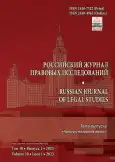Analysis of Contradictions in Evidence in a Court Verdict
- Authors: Astafyev A.Y.1
-
Affiliations:
- Voronezh State University
- Issue: Vol 10, No 1 (2023)
- Pages: 65-72
- Section: Criminal law
- Submitted: 08.12.2022
- Accepted: 13.02.2023
- Published: 18.04.2023
- URL: https://journals.eco-vector.com/2410-7522/article/view/115227
- DOI: https://doi.org/10.17816/RJLS115227
- ID: 115227
Cite item
Abstract
This article examines the issue of assessing the reliability of evidence in the verdict in the case of contradictions in facts examined in court. The procedure for eliminating contradictions in evidence, as noted in the article, is directly related to the substantiation of the court's conclusions in the verdict and, in general, to the peculiarities of judicial knowledge. The author addresses the problem of comparability of evidence in a criminal case and points out that in criminal proceedings there are situations of inconsistency of information in which individual contradictions in the evidence examined do not entail their mutual exclusion. It is noted that working with contradictions in the evidence shows the true ability of the law enforcer to think analytically.
Full Text
About the authors
Aleksey Y. Astafyev
Voronezh State University
Author for correspondence.
Email: woltgam@rambler.ru
SPIN-code: 4577-6659
Assistant Professor, Candidate of Legal Sciences
Russian Federation, VoronezhReferences
- Kuzansky N. Works in 2 volumes. V. 1. Moscow: Thought, 1970. 488 p. (In Russ.).
- Voskobitova LA. Cognitive activity of the court in criminal proceedings. Lex russica (Russian law). 2005;64(1):97–117. (In Russ.).
- Logical analysis of language: Inconsistency and anomaly of the text: Sat. Art. Ed. N.D. Arutyunova. Moscow: Nauka, 1990. 280 p. (In Russ.).
- Batishchev GS. Contradiction as a category of dialectical logic. Moscow: Vysshaya shkola, 1963. 120 p. (In Russ.).
- Ilyenkov EV. Philosophy and culture. Moscow: Politizdat, 1991. 464 p. (In Russ.).
- Astafiev AYu. Inner conviction of a judge and standard of proof in criminal cases. Forensic Library. 2014;(6):80–90. (In Russ.).
- Shchennikov AN. Complementarity in information processing. ITNOU: information technologies in science, education and management. 2019;1(11):24–30. (In Russ.).
- Tsvetkov VYa. Complementary relations. Scientific Bulletin of the Novosibirsk State Technical University. 2019;2(75):101–114. (In Russ.).
- Belkin RS. Collecting, examining and evaluating evidence. Essence and methods. Moscow: Nauka, 1966. 295 p. (In Russ.).
- Eisman AA. About some logical systems of connection of indirect evidence. Issues of criminalistics. 1964;12(27):50–69. (In Russ.).
- Shelegov YuV. Connections of circumstantial evidence among themselves and with the established fact. Siberian Legal Bulletin. 2014;(3):104–109. (In Russ.).
- Strogovich MS. The course of the Soviet criminal process. Vol. I. Moscow: Nauka, 1968. 480 p.
- Kertes I. Fundamentals of the theory of material evidence. Moscow, 1973. 100 p. (In Russ.).
- Bodnar AM. Psychology of memory: a course of lectures: [textbook]. Yekaterinburg: Izdatel'stvo Ural'skogo universiteta; 2014. 100 p. (In Russ.).
- Enikeev MI. Legal psychology. Moscow: Yurist. 1996. 631 p. (In Russ.).
- Sorokin AA. On the concept of contradiction in dialectics. Dialectical contradiction. Moscow: Politizdat, 1979. 343 p. (In Russ.).
Supplementary files








